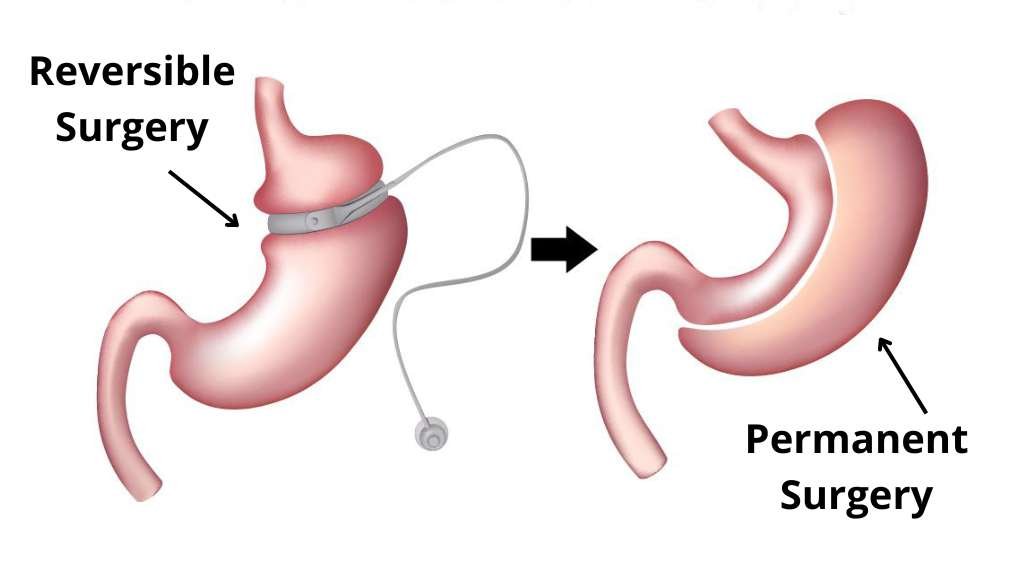Usually referred to as bariatric surgery, weight loss surgery modifies the digestive system to help higher-weight people shed significant weight. By shrinking the stomach or bypassing a section of the digestive system, these operations minimize food intake and nutrient absorption.
Learning about Weight Loss Surgery
Usually referred as bariatric surgery, weight loss surgery is a medical operation that modifies the digestive system to help higher weight people shed a large amount of weight. By shrinking the stomach or disregarding a section of the digestive system, these operations minimize the amount of food consumed and the amount of nutrients absorbed.
Types of Surgeries for Weight Loss
There are several kinds of weight loss operations, and each has a special method:
Gastric Sleeve Surgery (Sleeve Gastrectomy)
During gastric sleeve surgery, a portion of the stomach is removed to create a smaller stomach pouch. This reduces the quantity of food that can be consumed, leading to weight loss.
Procedure for Gastric Bypass (Roux-en-Y Gastric Bypass)
This procedure creates a small stomach pouch and reroutes the small intestine to bypass part of the digestive system, reducing both food intake and calorie absorption.
Banding the stomach (Lap-Band Surgery)
A band is placed around the top portion of the stomach to create a smaller stomach pouch, limiting food consumption without altering the digestive process.
Duodenal Switch
This surgery combines aspects of gastric bypass and sleeve gastrectomy. It involves removing a portion of the stomach and rerouting the small intestine to reduce food absorption.
Safety points to remember
When selecting a weight-loss surgery, safety is the top priority. Although the majority of bariatric surgeries are safe, each procedure has advantages and disadvantages of its own. A few things that affect safety are:
Surgical Expertise
A key factor in ensuring the procedure’s safety and success is the surgical team’s experience and proficiency.
Patient Health
When assessing whether a given surgery is appropriate and safe, the patient’s general health and medical history are important factors to consider.
After-Operation Care
For a safe and long-lasting recovery, proper after care is important. This includes follow-up visits, dietary recommendations, and lifestyle modifications.
The Safest Weight Loss Surgery
Although everyone has different views on safety,. Gastric sleeve surgery, also known as sleeve gastrectomy, is frequently regarded as one of the safest weight loss procedures available. Here are a few reasons for this:
Reduced Complication Risk
Compared to gastric bypass or duodenal switch, gastric sleeve surgery is a less complicated operation that may lead to fewer difficulties.
No Intestinal Bypass
The risk of some problems, such as loss of nutrients, is lower with gastric sleeve surgery since it does not involve rerouting the intestines. This is in contrast to gastric bypass surgery.
Shorter Hospital Stay
Compared to more complicated procedures, patients undergoing gastric sleeve surgery usually experience a shorter hospital stay, which helps enable a quicker recovery.
Assessment and Counseling of Patients
It is important to do a thorough assessment of the patient’s health, lifestyle, and weight reduction objectives before suggesting any type of weight loss surgery. Patients should be carefully assessed by medical professionals, including psychologists, to make sure they are good candidates for surgery and are aware of the possible dangers and advantages.
After-Operation Support and Care
Patients need continued care and direction after weight loss surgery in order to guarantee a successful and safe recovery. This includes scheduling routine follow-up visits with medical professionals, following dietary recommendations, including physical exercise, and attending to any issues or difficulties that may come up.
Patient Assessment and Counseling
A complete evaluation of the patient’s health, way of life, and weight reduction objectives is necessary before recommending any weight loss operation. Patients should be thoroughly evaluated by medical professionals, including psychologists, to make sure they are good candidates for surgery and are aware of the possible dangers and advantages.
After Surgery Care and Assistance
In order to guarantee a safe and effective recovery, patients need continuous assistance and supervision after weight loss surgery. This includes scheduling routine follow-up visits with medical professionals, following dietary recommendations, including physical exercise, and addressing any issues or difficulties that may arise.
In the end, gastric sleeve surgery is a popular and generally safe option for many people suffering from obesity, even if there isn’t a single best weight loss procedure. However, the choice should be made after consulting with knowledgeable medical experts who are able to assess individual needs and provide customized advice for the most effective plan of action. Finding a better weight and way of life still requires putting security, efficiency, and long-term success first.
Exploring ahead, TurkeyObesity is dedicated to offering the best possible treatment alternatives and support to anyone looking for ways to lose weight. With personalized attention and assistance, our knowledgeable staff is here to help you at every turn. For a convenient near-you consultation, get in touch with us and start your road to a healthy self.
Frequently Asked Questions (FAQs)
- What is weight loss surgery?
Bariatric surgery, another name for weight loss surgery, is a type of surgery that helps individuals with obesity lose weight by changing the way their food is digested.. It involves operations including gastric banding, gastric bypass, and gastric sleeve surgery.
- Who is a candidate for weight loss surgery?
Candidates undergoing weight reduction surgery usually have a body mass index (BMI) of 40 or more, or if they have health issues associated to obesity, such as diabetes, hypertension, or sleep apnea, and have a BMI of 35 or higher.
- What are the benefits of weight loss surgery?
Weight reduction surgery can result in considerable and long-term weight loss, improved or resolved obesity-related health issues, improved quality of life, increased mobility, and greater self-confidence.
- How long is the recovery period after weight loss surgery?
The recovery time varies according on the kind of surgery and individual characteristics. In general, patients should expect to resume regular activities within a few weeks to a month of surgery, with full recovery and weight loss over several months.
- What dietary changes will I need to make after weight loss surgery?
Patients usually begin with a liquid diet following surgery and continually progress to soft meals and then solid foods over a period of time. To maintain optimal healing, weight loss, and nutritional balance, follow the dietary suggestions recommended by your healthcare team.
- How long does it take to see weight loss results after surgery?
Weight loss outcomes depend on the person, however, many patients lose considerable weight within the first six months to a year of surgery. Commitment to post-operative instructions can result in continued weight loss and health improvements in the months and years after surgery.
- Is weight loss surgery covered by insurance?
Some insurance policies may cover weight-loss surgery, particularly if it is considered medically important because of obesity-related health issues. It’s important to verify with your insurance company and explore coverage alternatives with your medical team.













